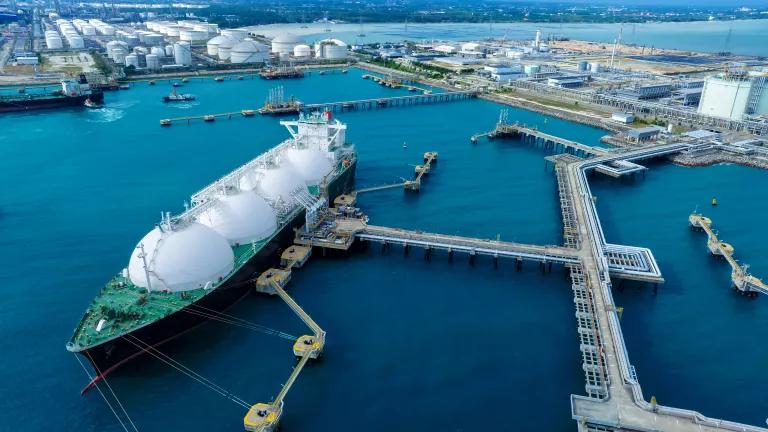Climate Must Be Central to US-Mexico-Canada Relationship
Mexico is creating hurdles for renewable energy investment and doubling down on fossil fuels.
Mexico’s energy policies continue to raise red flags in its North American neighbors, and with good reason. During a visit to Mexico to commemorate the one-year anniversary of the new North American trade agreement, the US and Canadian trade representatives, Katherine Tai and Mary Ng, expressed concerns with Mexico’s energy policies. Their comments were primarily focused on the impact these policies have on investments in the energy sector. But the even bigger problem is the impact they have on our shared climate. The US and Canada are drawing closer by launching a new cooperative agreement on clean energy innovation and energy. In contrast, Mexico is creating hurdles for renewable energy investment and doubling down on fossil fuels. It’s urgent for climate to be at the center of US and Canadian engagement with Mexico.
Outlook for clean energy market in Mexico still highly uncertain
In the June 6th mid-term elections President Andrés Manuel Lopez Obrador’s (AMLO) party, MORENA, lost some of the momentum that brought him to power in 2018. However, the election results did not dampen his resolve to strengthen the fossil fuel-dependent state owned energy companies CFE and PEMEX. Despite losing seats in Congress, MORENA gained significant power nationally and he continues to push forward measures, including a constitutional reform, that would result in Mexico further falling behind on clean energy and climate.
MORENA’s coalition failed to achieve the two-thirds supermajority required to push through a constitutional change on its own. But following the election results AMLO announced three planned constitutional changes, including one aimed at strengthening CFE by restricting private participation in the electricity market. He made clear MORENA’s intention to negotiate with opposition parties to gain approval for constitutional changes and some local analysts have noted that individual members of the opposition may be willing to side with AMLO. The governing coalition did win control of legislatures in at least 20 states, enough to ratify constitutional changes.
Suspension of anti-renewables Energy Industry Law reform lifted
To add to the uncertainty, a court recently revoked a definitive suspension of the AMLO-backed Electric Industry Law (LIE) reform which seeks to re-establish CFE’s market power and discourages private investment in solar and wind. In March, following numerous legal injunctions, a judge had suspended indefinitely the controversial reform pending a final ruling on its constitutionality.
In lifting the suspension, the tribunal which is specialized in economic competitiveness argued that the effects of the LIE reform were “uncertain acts,” not direct and immediate obligations and that, therefore, the reform could not be suspended in particular with general effects.
While the tribunal’s decision does not represent a ruling in favor or against the LIE reform and a suspension based on environmental impacts is still in place, the ruling highlights the ambiguity in the marketplace for investors. CFE’s CEO, Manuel Bartlett, celebrated the ruling saying it was a precedent for other pending judicial reviews to be declared inadmissible.
PEMEX doubling down on fossil fuel infrastructure and investments
At a time when large oil companies are beginning to shift away from new fossil fuel investments, particularly refining, Mexico’s PEMEX is digging itself in deeper. In May, AMLO announced that PEMEX would buy the 50.1 percent stake in the Deer Park refinery in Texas owned by Shell. The $596 million purchase would give PEMEX full control of the 340,0000 b/d refinery and according to AMLO, by processing Mexico’s heavy crude, it would allow the country to achieve fuel self-sufficiency by 2023.
The move is controversial on multiple fronts. First, to pay for the purchase Mexico may apparently divert resources from some of the 109 public trust funds that were recently terminated and from the national infrastructure fund, FONADIN. The trust funds that were canceled las year as part of austerity measures supported scientific and environmental research, climate programs, disaster preparedness and human rights programs. Scientists are rightly enraged that funds that are meant to advance research and strengthen Mexico will instead be used on an oil refinery that will continue to contribute to the climate crisis.
There are also serious questions about PEMEX’s preparedness to manage this type of facility. According to an analysis by the think tank México Evalúa, the company is one of the three oil and gas firms with the lowest environmental, social and governance indicators. The study which looked at PEMEX refining operations found that between 2018 and 2019, carbon dioxide and sulfur oxide emissions increased by 32% and 69%, respectively, and no apparent measures were taken to mitigate these contaminants. The study also points to elevated levels of toxic water pollutants near the PEMEX Miguel Hidalgo refinery.
In a recent letter, U.S. Congressman Brian Babin raised concerns about the environmental, health and economic risks to Texas citizens living near the Deer Park facility saying “simply put, Pemex does not have the executive, managerial, or technical talent to operate the Dear Park refinery safely.” As if to hammer Babin’s concerns home, last week’s “eye of fire” blaze near one of the company’s oil platforms in the Gulf of Mexico highlighted that PEMEX has a long record of industrial accidents and the fossil fuel industry in general is a liability and a risk.
It doesn’t have to be this way
AMLO’s actions are rooted in energy nationalism that seeks to achieve “energy sovereignty” for Mexico. What better way to achieve this then by tapping the country’s vast renewable energy resources to create new economic opportunities and build a cleaner more sustainable future for local communities?
Rather than putting the brake on renewable energy, the Mexican government should embrace opportunities. An example is a new $100 million solar plant announced in the state of Sonora that will be co-owned and operated by CFE. Located along the US border, Sonora has some of the greatest solar potential in the country. Meanwhile, instead of burning money on ill-advised oil refinery investments, the public funds in the FONADIN infrastructure fund could instead be used to support more low carbon public transport infrastructure, like Jalisco’s BRT system in Guadalajara which will include the country’s first all-electric bus corridor.
The visit by Katharine Tai and Mary Ng to Mexico was part of the important work of stitching the North American relationship back together again. It’s critical for collaboration on climate and clean energy to be one of the threads that binds the renewed relationship.




